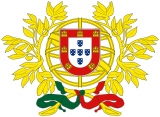 |
|---|
| Constitution |
Elections in Portugal are free, fair, and regularly held, in accordance with election law.[1]
Only the elections since the Carnation Revolution of 1974 are listed here. During the period encompassing the Constitutional Monarchy and the First Republic there were also elections, but only for a limited universe of voters. During the Estado Novo regime, from 1926 to 1974, the few elections held were not up to the democratic standards of their time and never resulted in power transfer.
Portugal elects on a national level the President and the national Parliament, the Assembly of the Republic. The President is elected for a five-year term by the people while the Parliament has 230 members, elected for a four-year term by proportional representation in multi-seat constituencies, the districts. Also on a national level, Portugal elects 21 members of the European Parliament.
The Autonomous Regions of Azores and Madeira elect their own regional government for a four-year term, usually on the same day. The first regional elections were held in 1976.
On a local level, 308 Municipal Chambers and Municipal Assemblies and 3,092[2] Parish Assemblies are elected for a four-year term in separate elections that usually occur on the same day.
- ^ "Portugal". Freedom House. 5 January 2018. Retrieved 11 October 2019.
- ^ DGAI - Reorganização Administrativa do Território das Freguesias - (RATF)